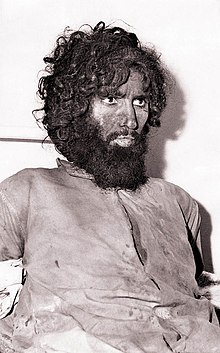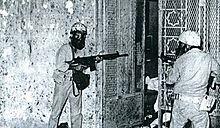Occupation of the Great Mosque in 1979

The occupation of the Great Mosque from November 20 to December 5, 1979 was an act of terror in which around 500 militant Islamists took control of the Great Mosque of Mecca and many pilgrims, possibly killing over 1,000 people. The action under the leadership of Juhaimān al-ʿUtaibī aimed to overthrow the royal dynasty of the Saud and to establish an eschatological state of God. After the bloody suppression of the insurgents, many of them were executed. The occupation is considered to be a key event for the emergence and development of Islamist terrorism .
course
On the morning of November 20, 1979, New Year's Day in 1400 according to the Islamic calendar , a group of up to 500 heavily armed radical Islamists from several Arab countries stormed the Great Mosque in Mecca and took thousands of the assembled believers hostage. The leader of the group was Juhaimān al-ʿUtaibī , a fundamentalist preacher. The insurgents, driven by eschatological ideas, declared that the end of the world was at hand and the Mahdi had come in the form of Muhammad ibn Abdullah al-Qahtani . They called for the adoption of Islamic legal systems in all Muslim countries, for the overthrow of the Saudi royal family and for a break in diplomatic relations with Western countries and demanded that no more oil be supplied to the USA. They expected their action to spark a worldwide uprising by Muslims against their supposedly un-Islamic governments and against the supremacy of the West. The attack on the Great Mosque was primarily intended to hit the prestige of the Saudi royal family as the guardian of the holy places of Islam.
King Khalid had the national borders closed. On the afternoon of November 20, 1979, the mosque was surrounded and the power cut off. A large number of the hostages were gradually released. The Saudi government obtained a fatwa from the top theologians, the ulema , allowing the use of force in the holy city. Only after protracted fighting was it possible, after more than two weeks, to force the last remaining insurgents, including Juhaimān al-ʿUtaibī, to give up. The alleged Mahdi was killed by a grenade on the third day. The fights in the labyrinthine basement rooms of the mosque, in which tear gas was used and in which an anti-terrorist unit of the French gendarmerie GIGN participated, were particularly costly . Many Muslims felt that the Saudi king had called “infidels” into the holy city of Mecca an irreparable shame, even if it was subsequently claimed that the French gendarmes had converted to Islam before they were deployed.
According to official figures, the occupation caused 330 deaths among the hostage takers, the hostages and the security forces; other estimates even speak of a thousand victims. 63 insurgents, including al-ʿUtaibī, were beheaded on January 9, 1980 in a mass execution in eight cities in Saudi Arabia.
aftermath
On November 21, the US embassy in Islamabad was burned down by an angry mob . The Iranian revolutionary leader Ayatollah Khomeini expressed the assumption in a radio message that Americans were responsible for the occupation. There were other anti-American protests in the Philippines , Turkey , Bangladesh , other cities in Saudi Arabia , the United Arab Emirates and Libya .
The Saudi royal family, which had already religiously legitimized its rule since the 1960s in order to ideologically counter both Nasser's Arab nationalism and communism , intensified its religious policy as a result of the terrorist act. Religious regulations of the Sharia were tightened and strictly controlled, Islamic preachers and religious scholars gained increasing influence. The latter are said to have demanded and received billions for their fatwa in order to intensify Wahhabi proselytizing abroad. These efforts later become the basis for the radicalization of Muslims in some neighboring countries.
The Middle East correspondent for Die Zeit , Martin Gehlen , assessed the effect in 2017 as follows:
“The three-year“ caliphate ”of IS led to extensive self-destruction in Sunni-Arab Islam, with Saudi Arabia at the top. The ideological poison for this historical decline was touched in the homeland of Mohammed, of all places, when the Saudi royal family promised the local Wahhabi fundamentalists a free hand after the desecration by occupying the Great Mosque in 1979 . From Morocco to Yemen, from Pakistan to Indonesia, their missionaries fought the indigenous, locally rooted religiosity as “corrupt” and “un-Islamic”, and the oil billions from the Al-Saud court ensured that this aggressive intolerance reached every corner of the earth was carried."
One example of this is the active support that the Saudis Islamist fighters gave in the war against the Soviet intervention in Afghanistan . The royal family was able to present itself as a loyal ally of the West and at the same time got rid of the most radical Islamists in their own country by letting them move to Afghanistan. Was among them Osama bin Laden , for the composition of the Grand Mosque a formative experience should have been.
The Südwest-Presse judged the event in 2015: The date has been forgotten in the West, but for the world of Arab Islam November 20, 1979 was a turning point with catastrophic consequences. With it began, as Navid Kermani put it in his peace prize speech, a war of Islam against itself, the almost complete break with its tradition, the loss of cultural memory, its amnesia of civilization . The multiethnic, multireligious and multicultural Orient went under, says Kermani, the Orient, “which I studied in its great literary evidence from the Middle Ages and during long stays in Cairo and Beirut, as a child during the summer holidays in Isfahan, as a threatened one , had never learned to love an ideal, but still lively reality. "
Archaeological find
During the fighting, a bomb exploded and the floor of the Kaaba was torn open. Several pre-Islamic idols emerged, which the Saudi authorities quickly eliminated. Nothing is known about their whereabouts.
Documentaries
- Mecca 1979 - Big Bang of Terror? Production: Arte / Das Erste. 2018. Director: Dirk van den Berg .
literature
- Florian Peil: Uprising in Mecca. The occupation of the Great Mosque in 1979 . Klaus Schwarz, Berlin 2006 ISBN 978-3-87997-639-3 (also Magister-Arb. FU Berlin 2004)
- Yaroslav Trofimov: Attack on Mecca. November 20, 1979 - The hour of birth of Islamist terrorism (from the American by Helmut Dierlamm). Karl Blessing Verlag, Munich 2008, ISBN 978-3896673350
- Lawrence Wright : The Looming Tower. Al-Qaeda and the Road to 9/11 . Knopf, New York 2006, ISBN 0-375-41486-X . German Output: Death will find you. Al-Qaeda and the road to September 11th . DVA, Munich 2007 ISBN 3-421-04303-5
- Johannes Reissner: The occupation of the Great Mosque in Mecca, in Orient. German Journal for Politics, Economics and Culture of the Middle East , 21, Deutsches Orient-Institut , Hamburg 1980 ISSN 0030-5227 pp. 193-203 (Deutsche Nationalbibliothek Frankfurt: DZb 9345; Leipzig location: ZB 61214)
Web links
- Andreas Förster: Attack in Mecca 1979 The blood trail of terror . In: Der Spiegel . January 7, 2016.
Individual evidence
- ^ After the mosque massacre in Mecca: Does the Saudis' throne wobble? In: The time . November 21, 2012, ISSN 0044-2070 ( zeit.de [accessed September 1, 2017]).
- ↑ Lawrence Wright : Death Will Find You , p. 112.
- ↑ Jonathan Randal: Osama , pp. 64-65.
- ↑ a b Heike Hupertz: Arte documentary "Mekka 1979": That was not the act of a single lunatic . In: FAZ.NET . ISSN 0174-4909 ( faz.net [accessed August 22, 2018]).
- ↑ Kim Ghattas: Black Wave. Saudi Arabia, Iran and the Rivalry that Unraveled the Middle East. Wildfire, London 2020, ISBN 978-1-4722-7111-2 , pp. 65 (English, limited preview in Google Book search).
- ↑ Olivier Da Location: Géopolitique de l'Arabie Saoudite . Éditions Complexe, Brussels 1996, ISBN 2-87027-622-2 , p. 34.
- ↑ Andreas Förster: Attack in Mecca 1979: The blood trail of terror. In: Spiegel Online - one day . Retrieved August 11, 2016 .
- ↑ Lawrence Wright : Death Will Find You . Pp. 112-117.
- ↑ It started in Mecca. ( Memento from November 15, 2016 in the Internet Archive ) In: Die Zeit , February 9, 2006.
- ↑ Sabine Korsukéwitz: In 1979 Shiite heretics presented the end-time prophet to the world. In: DeutschlandRadio Berlin , November 20, 2004.
- ↑ John Kifner: Khomeini Accuses US and Israel Of Attempt to Take Over Mosques . ( nytimes.com [accessed August 22, 2018]).
- ↑ 1979: Mob destroys US embassy in Pakistan. In: BBC (English).
- ↑ Erich Follath, The Duel of the Chosen , Der Spiegel , 39, 2015, p. 94, online
- ↑ The Saudi Poison , Die Zeit, November 12, 2017 online
- ↑ Lawrence Wright : Death Will Find You . Al-Qaida and the way to September 11th DVA, Munich 2007, p. 116 u. 120.
- ↑ Martin Gehlen, Südwest-Presse, October 24, 2015 Islam at war against itself
- ^ The Encyclopaedia of Islam. New Edition. Brill, suffering. Vol. 9, p. 5 (sanam)
- ↑ Documentary in the First: Mecca 1979 - Big Bang of Terror?
- ↑ Documentary on the attack in Mecca 1979, uprising in the Great Mosque by Jannis Hagmann, Middle East editor, TAZ August 27, 2018
- ↑ Arte documentary about Mecca 1979 Was the hostage-taking big bang of Islamist terror? , by Torsten Wahl, Berliner Zeitung August 21, 2018
Coordinates: 21 ° 25 ′ 19 ″ N , 39 ° 49 ′ 33 ″ E


